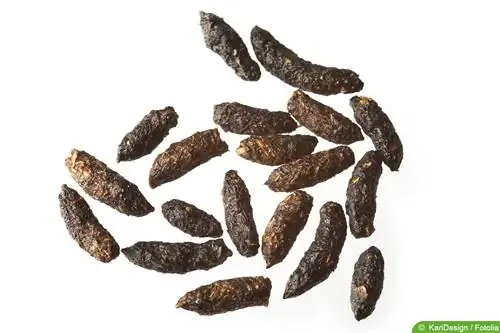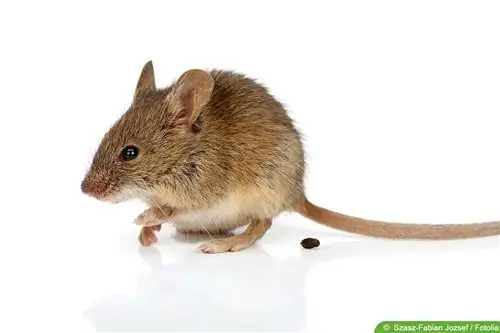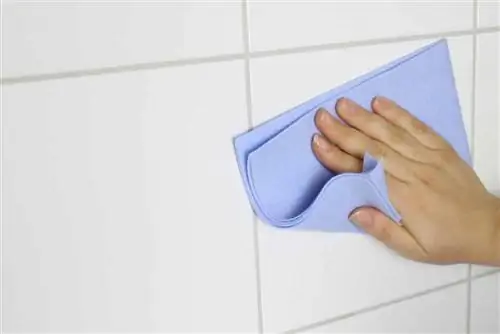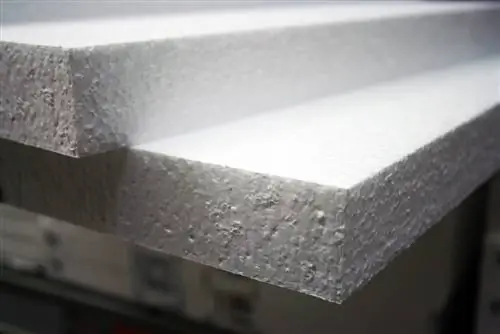- Author admin caroline@plants-knowledge.com.
- Public 2023-12-17 03:39.
- Last modified 2025-06-01 06:48.
The bank vole and other small rodents transmit the hantavirus, which is also dangerous for humans. Infection occurs through inhalation of mouse feces, which is why certain precautions are necessary when removing them.
What is Hantavirus?
There is not just one hantavirus, but many different ones. The pathogens are widespread and can be transmitted to humans through animal excretions. An infection causes a flu-like illness, during which the kidneys can fail. The bank vole in particular, but also other small rodents, carry the viruses and excrete them in their feces. There they remain infectious for a long time, even on dried mouse droppings. The animals themselves do not suffer from it. Incidentally, direct contact with infected mice is not necessary for an infection: inhaling infectious mouse feces above swirled dust is sufficient.
Dangerous infection sites
You are particularly at risk in these places:
- in deciduous forests, especially in beech and oak forests, e.g. B. when working in the forest
- when working in the field or in the garden
- in sheds, garden sheds or stables
- in attics and cellars
- when staying in areas heavily infested with rodents (especially southern and central Germany)
Remove mouse droppings properly
Especially when cleaning stables or sheds that may be infested with mice, you should proceed with caution and follow the following safety measures.
Shock ventilation
The first step before any cleaning operation is to ventilate thoroughly. Open doors and windows completely and don't just tilt them - there must be a proper draft so that air exchange can take place. In this way, you are already transporting some of the dangerous hantaviruses - as well as other pathogens - outside. It is also important that you are not in the room during the ventilation campaign, which lasts at least 30 minutes.
Protective Equipment
Hantavirus is transmitted primarily via the respiratory system, but also through skin contact. It is therefore important to prevent these routes of infection using suitable protective equipment. Wear during the cleaning operation
- high-necked clothing with long sleeves and trouser legs
- Disposable gloves that are thrown away after use
- a tight-fitting mouth and nose protection
Note:
An everyday mask is not very suitable as mouth and nose protection because it does not keep viruses out. Instead, choose an FFP2 or FFP3 mask, which offers 80 or even 99 percent protection.

Moisten mouse droppings
Since the viruses are inhaled when (dry) mouse droppings are stirred up by movements or drafts, you should prevent dust formation by moistening them. This dust development is particularly high when working with a broom or a vacuum cleaner and can therefore increase the risk of infection many times over. Moisten the mouse droppings as follows:
- Put water in a spray bottle
- Add a few drops of detergent
- A commercially available vinegar cleaner is suitable for this
- Shake the mixture vigorously
- Spray the solution onto the dirt to be removed
Do not use a vacuum cleaner
Do not remove the dirt with the vacuum cleaner, as this will spread the fecal dust and viruses further into the room via the exhaust air. Instead, it's best to use a shovel and broom, sweep up all the dirt and then put it in a plastic bag. This is tightly closed and disposed of with household waste. Don't throw them in the household waste first, but rather in the rubbish bin.
Note:
If there are only a few mouse droppings, you can also pick them up with a sturdy kitchen towel. However, you should also dispose of the cloth afterwards.
After-cleaning
The affected areas are then thoroughly, damply cleaned. This not only serves to protect against viruses and other pathogens, but also to completely remove traces of feces and urine as well as any unpleasant odors that may have arisen. A vinegar cleaner (this time applied undiluted) or a commercially available disinfectant are very suitable for this purpose.
Alternatively you can also useNatron:
- apply a thick layer of baking soda (e.g. imperial soda)
- alternatively use corn starch
- moisten using a spray bottle filled with water
- leave on for a day
- Remove powder and wipe with a damp cloth
Note:
After cleaning, you should wash your clothes at at least 60 degrees Celsius and wash your hands thoroughly. However, it is better to also take a shower and don't forget to wash your hair.
Prevention
However, the best way to protect yourself and your relatives from the hantavirus is to prevent a mouse infestation from the outset orfight someone like that immediately. Suitable for this are traps, laying out poison bait and, if the occurrence is severe, an experienced pest controller. Caution is particularly advised if you live near a forest or park with lots of beech or oak trees, as the main vector of the virus, the bank vole, is particularly common in this area. To keep them and other rodents away from your home, these precautionary measures are useful:
- Never store food open, but always in an airtight container
- the same applies to animal feed, especially grain and corn
- Do not leave animal food out overnight (e.g. chicken feed)
- Only dispose of waste in well-sealed garbage cans
- no leftover food in the compost heap
- Remove shelter options (e.g. piles of leaves, wood and stones)
- Do not leave bulky waste standing for a long time
- close possible loopholes in buildings






